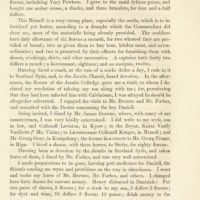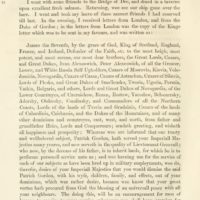
Related
![1686] DIARY OF PATRICK GORDON. 155 Crossing the Black River](https://cdn2.picryl.com/thumbnail/1699/12/31/1686-diary-of-patrick-gordon-155-crossing-the-black-river-daa006-200.jpeg)
1686] DIARY OF PATRICK GORDON. 155 Crossing the Black River
![1686] DIARY OF PATRICK GORDON. 123 by the river, well fortifyed with a wall](https://cdn2.picryl.com/thumbnail/1699/12/31/1686-diary-of-patrick-gordon-123-by-the-river-well-fortifyed-with-a-wall-7f3356-200.jpeg)
1686] DIARY OF PATRICK GORDON. 123 by the river, well fortifyed with a wall
![1666] DIARY OF PATRICK GORDON. 63 ing the river, 1 passed by them without noise](https://cdn2.picryl.com/thumbnail/1699/12/31/1666-diary-of-patrick-gordon-63-ing-the-river-1-passed-by-them-without-noise-bdf220-200.jpeg)
1666] DIARY OF PATRICK GORDON. 63 ing the river, 1 passed by them without noise
![1686] DIAKY OF PATRICK GORDON 139 passed the river Wherf by a stone bridge, at Wethersby](https://cdn2.picryl.com/thumbnail/1699/12/31/1686-diaky-of-patrick-gordon-139-passed-the-river-wherf-by-a-stone-bridge-at-cad1f9-200.jpeg)
1686] DIAKY OF PATRICK GORDON 139 passed the river Wherf by a stone bridge, at Wethersby
![1654] DIARY OF PATRICK GORDON. 15 hoped to have found Duke Radzlvill](https://cdn2.picryl.com/thumbnail/1699/12/31/1654-diary-of-patrick-gordon-15-hoped-to-have-found-duke-radzlvill-e5cc52-200.jpeg)
1654] DIARY OF PATRICK GORDON. 15 hoped to have found Duke Radzlvill

116 DIARY OF PATRICK GORDON. [1686 a third, on the way to Konigsberg
![1686] DIARY OF PATRICK GORDON. 137 It is needles to make a discrlption of all the particular places](https://cdn2.picryl.com/thumbnail/1699/12/31/1686-diary-of-patrick-gordon-137-it-is-needles-to-make-a-discrlption-of-all-fc58aa-200.jpeg)
1686] DIARY OF PATRICK GORDON. 137 It is needles to make a discrlption of all the particular places
![1661] DIARY OF PATRICK GORDON. 43 Wee rose early, and, towards eveniug, came to Kokenliausen](https://cdn2.picryl.com/thumbnail/1699/12/31/1661-diary-of-patrick-gordon-43-wee-rose-early-and-towards-eveniug-came-to-0170c2-200.jpeg)
1661] DIARY OF PATRICK GORDON. 43 Wee rose early, and, towards eveniug, came to Kokenliausen

150 DIAEY OF PATRICK GORDON. [1686 Nethermuir. I went thereafter to the Links
14 DIARY OF PATRICK GORDON. [1653-5-t continent. Below, towards the river, and all along the side of the hill, towards Grandents
Summary
Passages from the diary of General Patrick Gordon of Auchleuchries : A.D. 1635-A.D. 1699"
14 DIARY OF PATRICK GORDON. [1653-5-t
continent. Below, towards the river, and all along the side of the hill,
towards Grandents, ar many lair orchards and gardens, as also by the river
a large suburb, called the Fishery. It hath within the towne three mo-
nasteryes, a Dominican, Franciscan, and of Votaresses, and a large cathedrall.
There ar fair lands belonging to the to^^ne, which is divided among the
burgers ; who, of beer brewing, and buying of cornes, for the most part have
their livclyhood.
Here I passed the tyme during the winter, when falling in acquaintance
with one John Dick, who was prentice to a merchant called Robert Sleich,
I was perswaded by him to travell further up into Polland ; and, because I
was much inclined to be a souldier, he told me that Duke Ian Radzewill
had a lyfe company, all or most Scottismen, where wee would without
doubt be accommodated.
[A.D. 1654]
So, takeing my leave of friends here, I began againe a jorney on foot,
in company of the foresaid John Dick, who had left his service. My stock
was much the same as I liad when I came from Brawnsberg, haveiug gott
foure dollers from a friend upon my way ; but ray habit was farr changed,
for, towards the winter, I had translated my c'.oak into a Polls upper coat,
and lyned it with sheepskines. The first night, wee went to a village, and
lodged by a Skotsman, who lived thei-e. The next day, we passed by a
gentleman's house, called Gzin, and so the direct way to Thorun. When
wee were within a mile of the town, two waggons, with wood did overtake
us, to whom wee, being weai'ied, gave each two pence to lett us sitt up
to the towne. We entered the towne towards night, and tooke up our
lodging in a great house, on the west side of the market place, in the old
towne.
Here we stayed foure dayes, and then haveing with two Dutchmen,
who were bakers, hired a waggon for Varso, giveing each eight florens, wee
sett forward on Saturnday, betimes in the morning. The next day, wee
passed by Cuiafsky Brest, so called to distinguish it from another Brest in
Tjittaw, through Cowale and Gambin, two little townes, to Varsaw, which is
thirty miles from Thorun.
Wee tooke up our lodgeing in the suburb Lesczinsky, so called from a
pallace-like house hard by, built by noblemen of the family of the Lesczin-
skyes, The seym or parliament was sitting at this tyme in Varsaw, where we
Gordon was brought up and remained a lifelong Roman Catholic, at a time when the Church was being persecuted in Scotland. At age of fifteen, he entered the Jesuit college at Braunsberg, East Prussia, then part of Poland. In 1661, after many years experiences as a soldier of fortune, he joined the Russian army under Tsar Aleksei I, and in 1665 was sent on a special mission to England. After his return, he distinguished himself in several wars against the Turks and Tatars in southern Russia. In recognition of his service he was promoted to major-general in 1678, was appointed to the high command at Kiev in 1679, and in 1683 was made lieutenant-general. In 1687 and 1689 he took part in expeditions against the Tatars in the Crimea, being made a full general. Later in 1689, a revolution broke out in Moscow, and with the troops under his command, Gordon virtually decided events in favor of Peter the Great against the Regent, Tsarevna Sophia Alekseyevna. Consequently, he was for the remainder of his life in high favor with the Tsar, who confided to him the command of his capital during his absence from Russia. In 1696, Gordon's design of a "moveable rampart" played a key role in helping the Russians take Azov. One of Gordon's convinced the Tsars to establish the first Roman Catholic church and school in Muscovy, of which he remained the main benefactor and headed the Catholic community in Russia until his death. For his services his second son James, brigadier of the Russian army, was created Count of the Holy Roman Empire in 1701. At the end of his life the Tsar, who had visited Gordon frequently during his illness, was with him when he died, and with his own hands closed his eyes. General Gordon left behind him a uniquely detailed diary of his life and times, written in English. This is preserved in manuscript in the Russian State Military Archive in Moscow. Passages from the Diary of General Patrick Gordon of Auchleuchries (1635–1699) was printed, under the editorship of Joseph Robertson, for the Spalding Club, at Aberdeen, Scotland, 1859.
